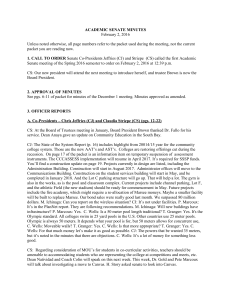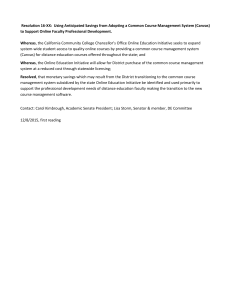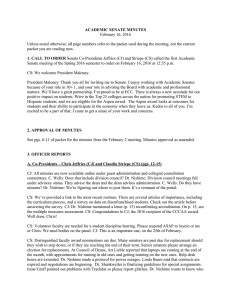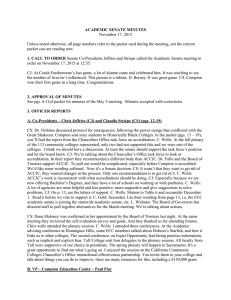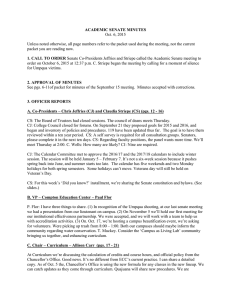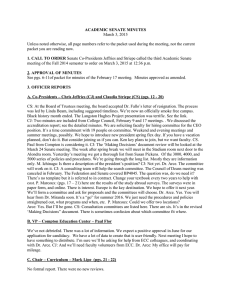ACADEMIC SENATE MINUTES April 19, 2016
advertisement
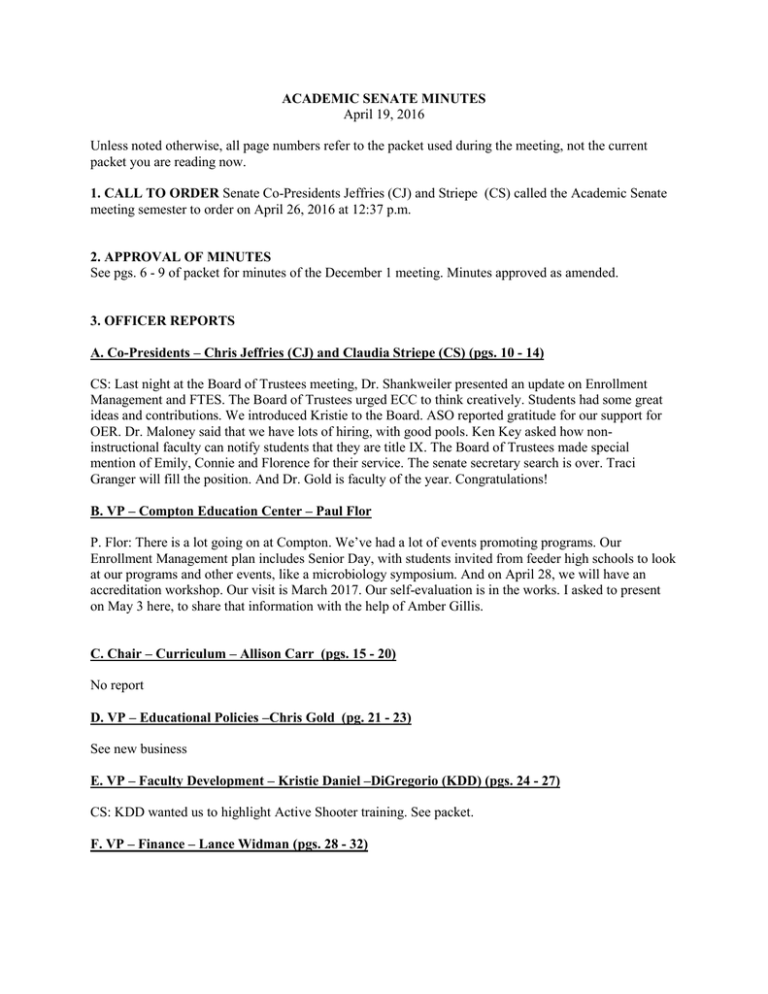
ACADEMIC SENATE MINUTES April 19, 2016 Unless noted otherwise, all page numbers refer to the packet used during the meeting, not the current packet you are reading now. 1. CALL TO ORDER Senate Co-Presidents Jeffries (CJ) and Striepe (CS) called the Academic Senate meeting semester to order on April 26, 2016 at 12:37 p.m. 2. APPROVAL OF MINUTES See pgs. 6 - 9 of packet for minutes of the December 1 meeting. Minutes approved as amended. 3. OFFICER REPORTS A. Co-Presidents – Chris Jeffries (CJ) and Claudia Striepe (CS) (pgs. 10 - 14) CS: Last night at the Board of Trustees meeting, Dr. Shankweiler presented an update on Enrollment Management and FTES. The Board of Trustees urged ECC to think creatively. Students had some great ideas and contributions. We introduced Kristie to the Board. ASO reported gratitude for our support for OER. Dr. Maloney said that we have lots of hiring, with good pools. Ken Key asked how noninstructional faculty can notify students that they are title IX. The Board of Trustees made special mention of Emily, Connie and Florence for their service. The senate secretary search is over. Traci Granger will fill the position. And Dr. Gold is faculty of the year. Congratulations! B. VP – Compton Education Center – Paul Flor P. Flor: There is a lot going on at Compton. We’ve had a lot of events promoting programs. Our Enrollment Management plan includes Senior Day, with students invited from feeder high schools to look at our programs and other events, like a microbiology symposium. And on April 28, we will have an accreditation workshop. Our visit is March 2017. Our self-evaluation is in the works. I asked to present on May 3 here, to share that information with the help of Amber Gillis. C. Chair – Curriculum – Allison Carr (pgs. 15 - 20) No report D. VP – Educational Policies –Chris Gold (pg. 21 - 23) See new business E. VP – Faculty Development – Kristie Daniel –DiGregorio (KDD) (pgs. 24 - 27) CS: KDD wanted us to highlight Active Shooter training. See packet. F. VP – Finance – Lance Widman (pgs. 28 - 32) pp. 28-30, 2/24 PBC Minutes: two items of particular interest, Technology Update and Faculty/Classified Hiring. Please carefully review these items in the packet. pp. 31-32, 3/3 PBC Minutes: Of particular interest is the Master Plan Update. Again, please carefully review this item in the packet. Planning Summit held last Fri., 4/15. Report forthcoming. G. VP – Academic Technology – Pete Marcoux No report. H. VP – Instructional Effectiveness/ Assessment of Learning Committee and SLO’s Update – Russell Serr (pgs. 33-36) CS: Russell asked us to highlight the SLO training schedule (see PPT for dates and locations.) 4. SPECIAL COMMITTEE REPORTS A. ECC VP of Academic Affairs and ECC VP of Student and Community Advancement – Jean Shankweiler and Jeanie Nishime Dr. Shankweiler: We have a lot of hiring, and with good candidates. The enrollment management plan has been sent to Chris and Claudia and PBC. All comments welcome. Also, congratulations Chris Gold on being a distinguished faculty member. I also want to congratulate all the nominees. Today is the Presidential Scholars and Academic Achievement awards. Please come by. Dr. Nishime: I want to recognize distinguished staff Blanca Prado. We announced her award during last week’s conference. We’re happy to recognize her work. The Master Planning summit was last Friday. We had a great group and good ideas came from that. We will also look at SSSP, Student Equity, etc. to support master plan. An integrative plan retreat is upcoming in August. We will bring it to senate in fall, and to BOT in November. A new grant, BSI (basic skills initiative) has been awarded It’s 1.5 million, over three years. Congrats to basic skills faculty. We will pilot the Starfish early alert this summer. 5.UNFINISHED BUSINESS A. Change in Minimum Qualifications for Communication Studies – C. Gold and C. Wells. This is the second reading and will be voted on. 37-44 CJ: BP/AP3710 (securing of copyright) is not in the packet. We’ll return to it in fall. A change in minimum qualifications is in the packet. C.Wells: Can address questions. C.Wells: There is a lot of support in the state for this. We have a second for it. It will go to his plenary. P. Marcoux: Move to approve. L. Widman: Seconded. C. Wells: Only one person was against it in the western states. This is consistent with many other western states. This will be a good plenary. CJ: We are voting on the changes to minimum qualifications (p. 37.) All in favor? No opposed or abstentions. See attendance for senators voting in favor. 6. NEW BUSINESS A. Recommendation of the ECC Academic Senate Course Management Task Force – P. Marcoux and C. Gold CJ: See p. 45 of the packet for the system task force objective. C. Gold. The senate must make a recommendation if we choose to switch. We’ve worked along side DEAC. They advise the Director of the Learning Resources Unit. The ITS department weighed in, and the DE department, and ASO. P. Marcoux: They were receptive. C. Gold: The Chancellor’s Office recommends that decision based on the recommendation of the state senate. The state has funded many initiatives, including OEI (see PPT for details.) We can use CANVAS to access resources. Involved colleges will use the course exchange, in a process that is seamless for students. Even enrollment is done for students. P. Marcoux: And it could boost enrollment. C. Gold: Or we could lose enrollment by not participating. C. Wells: How do our online offerings compare? Is our program robust? C. Gold: Some do and some don’t. We don’t have a robust program. C. Wells: Will we gain enrollment. C. Gold: We need to be thoughtful about it. We have a high quality program. C. Wells: Can we hire an outside faculty to teach a course for us? We could poach adjunct faculty from other colleges. C. Gold: That’s an advantage to CANVAS; it’s easier for our adjunct faculty. H. Storey: At this point we are not recommending that we participate in the course exchange. C. Gold: Correct. We are just switching to CANVAS. 71 colleges are migrating to CANVAS. Of the 113 in system many have already switched. There is a migration tool. P. Marcoux: This will take 18 months. The recommendation goes to the cabinet, then to ITS (if approved by the cabinet). It will likely be Spring of 2017 when faculty get their shells. But you can get one now on your own. Etudes will be offered until Spring of 2018. C. Gold: Here are some pros and cons. Pros include participation in the exchange, there are FTES advantages, and tech support is really good. The Chancellor’s Office does the contracts. The cost isn’t a pro, but it’s free during the transition. The Chancellor’s Office offers training. Etudes is familiar. The relationship with the company is valued. It takes time to learn a new program, and staff will be retrained. Student evaluations are streamlined through Etudes. There is one login on etudes. Here are the results from the DEAC survey. H. Storey: We are concerned about faculty input, and student input too, and I want to thank Irene and IR office. More faculty are experienced with CANVAS. Some faculty had used both. Faculty that had used both preferred CANVAS. You don’t have to teach online to use a LMS. You can use it in a traditional class. Most faculty (78%) would consider switching to CANVAS. These faculty would like resources and the support the Chancellor’s Office goal to create a state wide system. P. Marcoux: We haven’t heard from people against moving to CANVAS. C. Gold: This is the resolution from the task force (see slide.) We recommend that we switch to CANVAS, and that online teachers be grandfathered in. and that faculty gain tech support. We want monetary savings to support professional development. P. Marcoux: This is the first reading. We will vote next meeting. C. Wells: Did the people who switched need training? C. Gold: Not me or Sara Di Fiori. P. Marcoux: We’re not the first ones. K. Hull: For CANVAS users, can we waive training? H. Storey: That’s our typical model. We have a waiver process in place. D. Black: During the overlap period, will faculty decide what to use? P. Marcouz: Yes. A. Lieble: It’s up to teaching faculty, but try one of each. C. McFaul: Has anyone tried the migration tool? P. Marcoux: Other schools have, and they report that it’s easy. C. Gold: You will need to put in your syllabus. CJ: Other questions? Second reading May. 3. B. BP/AP 4228 Independent Study – C. Gold C. Gold: We’re revising an existing BP/AP. There is a template. Notice that the template is numbered differently, which we wish to change. The divisions were consulted, especially fine arts. We also checked it with the contract. CJ: The other thing (p. 48,) eligibility is a 3.4 cumulative. We changed that to 3.0 in disciplines. C. Gold: Standards have to be the same as regular courses, and students need access to instructors. 7. INFORMATION ITEMS –DISCUSSION A. Institutional Effectiveness Framework of Indicators 2016 – IRP 50-53 B. Student Success Scorecard and Institutional Effectiveness Outcomes Update – IRP I. Graff: This is Marci Myers, our SSSP Research Analyst. The student success scorecard is a mandate, state legislated, requiring us to publish academic outcomes based on data and other areas. We wanted to develop institutional outcomes. BP1200 is to this purpose, IE outcomes. This is year 2 of IEPI, a second state mandate for reporting student achievement measures. Thanks Claudia for opening the IE outcomes in PPT. Budget legislation requires that we set and publish goals to the public through the statewide portal. In year 1, they were identical goals as our IE outcomes. We need to set new goals for year 2. We could plateau, or set more ambitious goals. We need to make 3 decisions. Decision 1: Set 1 year and 6 year goals. Decision 2: We must report additional measure on unprepared population, completion rate, or remedial math rate. Last year we reported both. M. Myers: Using IE outcome goals for 2019, we met that goal for math already. We added 10% increases to those numbers. Decision 3: Optional college choice goal, reported locally. We can pick one or none. C. Wells: Have the math faculty been consulted? College algebra vs. statistics is an issue. I. Graff: Yes. I believe they have made a recommendation. I’ll double check. J. Ng: We have a department meeting Thursday and I think we will discuss it then. We can bring it up. Email us your questions. CJ: Art Martinez didn’t comment at the planning committee. C. Wells: Are there comparisons to other colleges? I. Graff: The Chancellor’s Office released the median. I think we are within that range. C. Gold. The completion rate goal seems high. Can we reset goals? I. Graff: That’s our published goal. We could lower it. C. Gold: The other goals seem attainable. When UC admits a lot of students, we may lose out. Dr. Nishime: We only measure the cohort that comes to us. C. Wells: Multiple forms of assessment impact this. Things have changed since the goal was set. I. Graff: There is no penalty for changing a goal. CJ: Are we looking at these today, and voting in two weeks? I. Graff: Yes. (CJ clarified the three items of interest for the senate.) C. Wells: Is there any reason not to report it? I. Graff: They are already published. It would make our information accessible. I C. EEO Plan – Jaynie Ishikawa J. Ishikawa: Our equal employment plan is getting attention from the Chancellor’s Office. It’s all covered under title IV. (Jaynie provided the framework.) I’m here to talk about developing a plan. It must be submitted to CCCCO every 3 years, and it’s due in June. It must incorporate six of nine methods. There is now funding for the new plan. (See PowerPoint for a description of the 9 methods, the demography of the students, and employee groups. ) C. Wells: Are we consistent with the service area for demography? J. Ishikawa: That’s a great suggestion to streamline it with the equity plan. Gender skewed areas are of interest. The ethnic distribution of the workforce is 50%, 64% tenure and tenure track white, non Hispanic. IR will replace this with older data to match. C. Wells: Is diversity of Masters Degrees awarded consistent with this data? C. Gold: They have the ethnic distribution of applicants, white are only 30 %. The data that is missing is eligibility. The Chancellor’s Office asks for that but won’t provide data. C. Wells: It’s also discipline specific. Please look at the plan, and the data analysis. CJ: Is there a link? J. Ishikawa: I can send a version to Claudia. J. Troesh: Does the plan incorporate data of breakdown of hires of tenure track faculty for the last five years. We have longevity of employees. J. Ishikawa: we want to report this area, including disabled employees. Diversity is more than ethnicity. Some data are misleading. CS: We chose realistic measurements. IR is short staffed. J. Ishikawa: The Chancellor’s Office recommended incorporating diversity in the evaluation process. CJ: Do we have to sign off, or give a blessing? CJ: I trust the committee. 8. FUTURE AGENDA ITEMS A. Bill Mulrooney – discussion regarding census, no-show and attendance reports; possibly looking at +/- grades B. William Garcia – possible loss of BOG Fee Waiver for students on probation 9. PUBLIC COMMENT 10. ADJOURN The meeting adjourned at 1:54.pm SD/ECC Spring16
